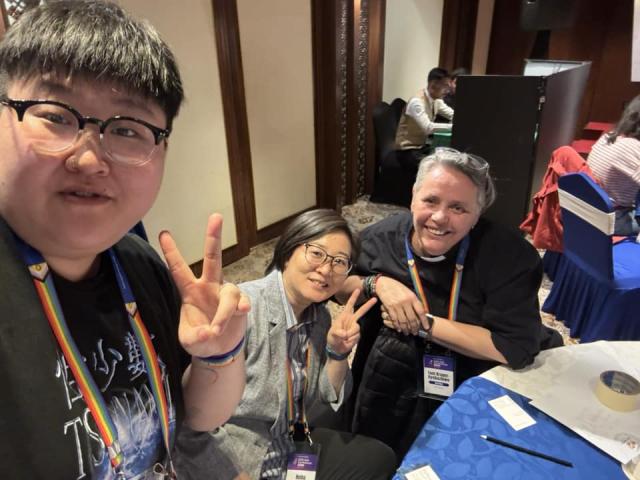Rev. Reina Ueno of Japan’s United Church of Christ on the warmth and solidarity she found at the ILGA Asia Conference on LGBTQIA+ issues in Asia.

From February 24 to 28, 2025, I attended the 10th ILGA (The International Lesbian, Gay, Bisexual, Trans, and Intersex Association) Asia Conference in Kathmandu, Nepal. “Diversity Dynamics: Unifying for a Just, Inclusive, and Sustainable Asia” brought together approximately 600 participants to address pressing issues affecting the LGBTQIA+ community in Asia. It was co-hosted by Blue Diamond Society, a pioneering LGBTQIA+ rights organization established in 2001 in Nepal that advocates for the equity, health, and well-being of sexual and gender minorities, and has been pivotal in legal gender advancements and marriage equality.
As a lesbian, the sight of hundreds of LGBTQIA+ participants in one place was something I’d never seen before, and immersed me in a positive energy that I rarely experience elsewhere. Even in Japan, I often feel isolated. But in Kathmandu, I felt at home, with a profound sense of security and belonging that I still carry with me.
The pre-conference began with sessions focused on lesbian, trans, bisexual, intersex, and other identities. I attended the lesbian session, where we exchanged experiences about the unique challenges facing lesbian communities across Asia, including the marginalization we often face. In regions where discrimination is severe, LBT women have fewer opportunities to come out. That kind of invisibility was something I had felt before deciding to be open about my sexuality.
As activists working in often hostile environments, the discussions we had on maintaining mental, emotional, and physical well-being felt especially necessary. The concluding meditation, which explored forgiveness, authenticity, and self-love, was one of the most powerful moments of the entire conference for me. Afterwards, everyone joined together in dance—about 40 lesbians moving freely in a space that felt truly safe—and it was beautiful.
An interfaith session honoured Muhsin Hendricks, the first Muslim leader to publicly come out as gay, who was recently killed in South Africa, as well as other Queer people who had passed away across different regions. Participants shared their experiences with anti-gender ideology. Muslim men and transgender people from South Asia spoke about being taught that “men shouldn't cry” or “shouldn't wear colorful clothes” according to their religious traditions. Women with Hindu or Buddhist backgrounds shared the pressures they faced regarding marriage and having children. We discussed creating safe spaces for all believers, and using religious events as opportunities for dialogue. Others highlighted issues like forced conformity, internalized shame, and religious exclusion.
An interesting debate emerged about whether religious texts themselves or their misinterpretations discriminate against LGBTQIA+ people. While most agreed that it was misinterpretation, I wondered why we need to defend scripture so strongly, given that the Bible itself is not God. Do we need to insist that the texts do not discriminate for them to be considered sacred? Despite these difficult discussions, everyone engaged positively, creating a space for collective healing and action.
Building relationships with activists from other countries was a valuable experience, especially with my co-attendee Daeun Seo from South Korea, who was incredibly supportive and kind after I lost my smartphone before my flight from Japan. Daeun and I supported Korean pastors who had been excommunicated by the Korean Church for blessing LGBTQIA+ people during Seoul Pride. She asked me to make a short statement and gather openly LGBTQIA+ Japanese pastors and church members to show solidarity. Surprisingly, I was able to gather a total of 37 signatures from all over Japan, in perhaps the first such show of action from openly LGBTQIA+ Japanese Christians. It highlighted how our struggles are interconnected across Asia, even when our specific contexts differ.
I also deeply valued the opportunity to connect with Japanese activists, whom I rarely encounter in my Christian working environment. Sharing space with other Queer individuals who understand Japan’s specific cultural and social challenges was deeply powerful; it reminded me of the importance of building community within our own contexts.
Despite our difficulties, LGBTQIA+ people are working together to create a fairer and more inclusive Asia. I’m grateful to the United Church of Canada for making this experience possible, and showing me how important allies and faith communities can be in supporting LGBTQIA+ rights. The conference reminded me that even though we face many challenges ahead, we’re not alone in this work.
Sometimes, home isn’t where you were born, but where you find your people. And for five remarkable days in Kathmandu, I found mine. These connections have renewed my commitment to creating spaces where we can all belong—both in Japanese society and in the Church.
—Rev. Reina Ueno is the Director of the Buraku Liberation Center of the United Church of Christ in Japan, a member of the National Christian Council in Japan’s Gender Justice Working Group, and one of the openly out Queer ministers in Japan.
The United Church of Canada has long been a leader in advocating for justice, equity, and inclusion, including for the 2SLGBTQIA+ community. However, the work of creating inclusive spaces within faith communities is still complex, particularly in global contexts where religious-induced homophobia and systemic oppression persist. In the Global South, where intersections of colonial histories, socio-economic inequities, and polarization fueled by anti-gender movements create unique challenges, courageous United Church partners, LGBTQIA+ people of faith, and allies are leading transformative efforts to advance LGBTQIA+ rights.
Support this work by donating to our 2SLGBTQIA+ Global Advocacy Fund. Your gift will advance the rights of 2SLGBTQIA+ people around the world. Make a Gift Today.
The views contained within these blogs are personal and do not necessarily reflect those of The United Church of Canada.